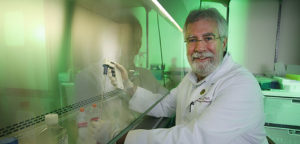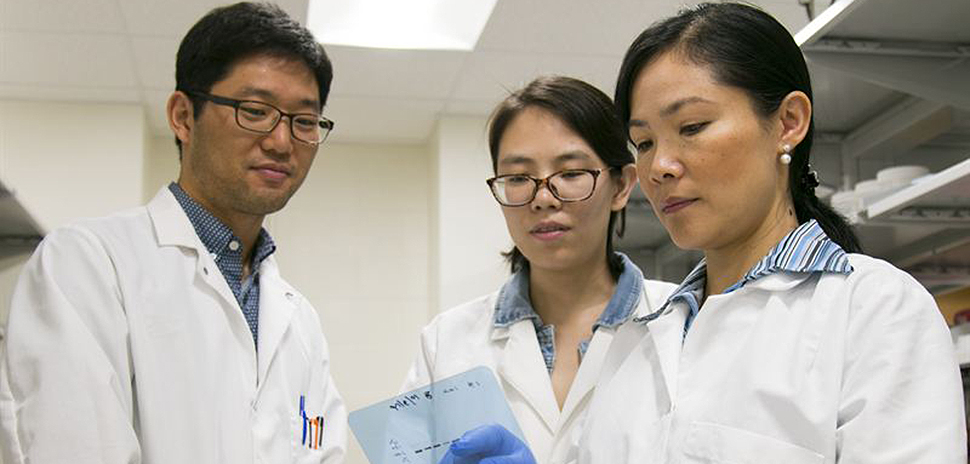RESEARCHERS EYE WAY TO CURB GLAUCOMA DAMAGE
Sometimes patience pays off in medical research.
That’s especially true for researchers at the University of North Texas Health Science Center in Fort Worth and the University of Iowa who have teamed up for two decades in ways to treat a type of glaucoma that damages the eyesight in millions of people and can lead to irreversible vision loss.

Abe Clark is a researcher at the University of North Texas Health Center in Fort Worth. [Photo courtesy of UNTHSC]
Recently, their work hit a milestone that could have implications on glaucoma treatment in the future.
The team used CRISPR technology, a genome-editing tool that can alter DNA sequences and modify gene function to eliminate myocilin, a protein tied to both juvenile and adult-onset open-angle glaucoma. The condition affects roughly 2 million people around the globe.
Getting rid of myocilin lowered intraocular pressure to prevent further eye damage, Abe Clark, regents professor and executive director of the North Texas Eye Research Institute at UNTHSC, said in a release.
“Using this technology, we were able to knock out the myocilin gene in mice, and we prevented a type of glaucoma,” he said. “We also looked at whether we could intervene after the mice have already had damage, and we were partially able to prevent further damage.”
The work, published online in the Proceedings of the National Academy of Science, the official journal of the National Academy of Sciences, showed the CRISP-Cas9 system could feasibly be used in culture human eyes, according to the release.
Scientists from the Massachusetts Institute of Technology also participated in the study.

Zui Pan (right) is a leading researcher on esophageal cancer. [Photo courtesy of University of Texas at Arlington]
ZINC IMPORTANT IN CANCER PREVENTION
A researcher at the University of Texas at Arlington has shown that zinc can significantly inhibit the speed of esophageal cancer cells.
According to a recently published study by Zui Pan, associate professor of nursing at UTA’s College of Nursing and Health Innovation and a respected esophageal cancer researcher, zinc selectively halts the growth of cancer cells, but not normal esophageal epithelial cells.
“Both clinical data and animal studies have shown that this mineral is very important for overall body health and for cancer prevention.”
Zui Pan
There were nearly 16,000 esophageal cancer deaths in the U.S. in 2016, according to data from the National Cancer Institute. It is the sixth-leading cause of human cancer deaths in the world.
Pan said the study could help lead to better esophageal cancer prevention and treatment.
The study was funded in part by a research grant from the National Institutes of Health – National Cancer Institute, the university said.
“Zinc deficiency has been found in many cancer patients,” Pan said. “Both clinical data and animal studies have shown that this mineral is very important for overall body health and for cancer prevention.”
STARTUP NAMED DEFENSE TECHCONNECT AWARDEE
A Fort Worth startup has been chosen as a 2017 Defense TechConnect awardee during the Defense Innovation Summit in Tampa, Florida.
“Only 15 percent of all innovations submitted to the Defense Innovation Summit (DiTAC) were selected.”
Dr. Suchismita Acharya
TechFW client AyuVis Research is focusing on a new class of antibiotics to counteract severe infections, according to a report in the Fort Worth Business Press.
The company’s selection puts them in a select group.
“Only 15 percent of all innovations submitted to the Defense Innovation Summit (DiTAC) were selected,” AyuVis founder and CEO Suchismita Acharya told the Business Press.
The Business Press said that the summit attracts innovators, businesses, and national defense leaders to accelerate state-of-the-art technology solutions in support of “national security and the warfighter” in energy, cyber, medical, systems, and space.
UTD BIOLOGY STUDENT RECEIVES NATIONAL AWARD

Karthik Hullahalli
A student at the University of Texas at Dallas has received a Raymond W. Sarber Award from the American Society for Microbiology.
Karthik Hullahalli, a senior in biological sciences, received the award that is given each year to one undergraduate and one graduate student nationwide. The award recognizes students’ research excellence and potential, UTD said in a release.
Hullahalli has been researching antibiotic resistance in pathogenic bacteria since his senior year in high school, according to UTD. He participated in the Anson L. Clark Summer Research Program as an incoming freshman and as a peer advisor.
UTD said that Hullahalli’s recent research with his mentor, Kelli Palmer, assistant professor of biological sciences, is working on engineering novel strategies to eliminate antibiotic-resistant bacteria, including “rewiring” bacterial immune systems.
You can read more about this accomplished student researcher here.
Get on the list.
Sign up to keep your eye on what’s new and next in Dallas-Fort Worth, every day.
And, you’ll be the first to get the digital edition of our new Dallas Innovates magazine:
The annual edition publishes in January.



























